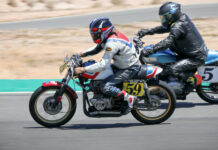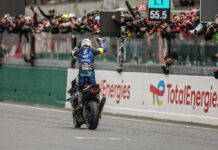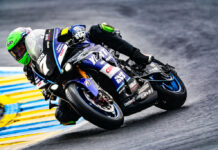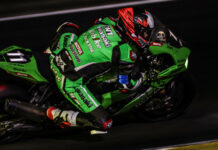Pirelli at Misano for the eni FIM Superbike World Championship with new solutions for the Superbike and Supersport classes
For the next event, the Italian tire company provides premier class riders with a new slick front solution and new rear in a soft compound dedicated only to Superbike riders; for the Supersport class a new development front tire in SC1 compound
Misano Adriatico (Italy), June 16, 2014 – Next weekend at the Misano World Circuit Marco Simoncelli will host the seventh round of the eni FIM Superbike World Championship, marking the halfway point of the Championship as well as the return to the Superbike calendar of Romagna’s circuit after last year’s absence.
In this round Pirelli will introduce some new development solutions for both Superbike and Supersport riders. In the premier class there will be a new front solution available to the riders as an alternative to the standard SC2, the T0020, which uses a compound that in terms of hardness is positioned midway between the standard SC1 and SC2 derived from the Imola tests of last May. There will also be a new rear option dedicated exclusively to Superbike riders (therefore not usable by the EVO riders), the T0722, in SC0 compound: the first soft solution designed specifically for the Superbike riders.
The news in Supersport is that the front solution in SC1 compound S1485 is available, which should provide greater support in the approach to the corners in favor of better and more precise steering.
In Superbike, the challenge is more open than ever after two successes from Marco Melandri during the last round at the Sepang circuit. The Misano Adriatico circuit is historically favorable to the Aprilia but the advantage of Tom Sykes (Kawasaki Racing Team) over the Italian rider from Noale’s manufacturer is still 54 points, while Sylvain Guintoli (Aprilia Racing Team) is second in the overall standings, has shortened the gap to 13.
At Misano also the minor classes of Superstock 1000 and Superstock 600 plus the European Junior Cup will return to the scene after missing out on the Malaysian circuit.
Misano World Circuit VS tires: an abrasive asphalt but with little mechanical grip
The Misano World Circuit Marco Simoncelli is 4226 meters long track with 10 right-handers and 6 left-handers curves, a minimum width of 12 meters and a total of 1850 metres of straights with the finish measuring 510 meters. The rider who is in pole position starts from the right side.
The circuit was built in 1969 and had an initial length of 3488 meters but, after a renovation project, in 1993 the track was lengthened to 4060 meters and a new building with garage was built.
Over the years the paddock area has been enlarged and different bleachers were built and at the end of 2006, work began on upgrading the circuit regarding the extension of the track to 4180 meters. The track was also reversed to become clockwise, while the circuit now takes the official name by which it is known today ‘Misano World Circuit.’
After the construction of a new 250 meter long exit lane from the pits , the circuit has reached is current length.
Misano World Circuit is a very sinuous track, the most challenging section is definitely the one after the fast “Curvone”; which is a series of right-hand corners that require a high mechanical and thermal stress for tires on the leaning shoulder. The straights are quite short and do not allow high ‘tipping in’ speeds, but they create different braking and acceleration points.
Even if the layout of the track is not particularly complicated, the tire choice is not trivial. Here, even more than in other contexts, it is necessary to take into account the weather and track conditions. With a very worn and uneven asphalt, with very little mechanical grip but with a decent standard of abrasiveness, with hot summer temperatures that may compromise the accuracy of the trajectory through the turn and holding a line.
From the rear tire will then be required several characteristics: first, to imprint a good grip on the road surface as effectively as possible and to allow good traction, at the same time a high thermal protection will be necessary due to high slippage and the working range of the tires will need be very high. Finally good abrasion resistance will be necessary to allow the completion of the race without severe loss of grip. More slippage also obviously creates higher tire temperature and as a consequence will affect consistency of performance and the abrasion resistance.
The above applies also for the front tire, plus the complication of having to maintain stability into the corner through the front axle. If, however, the rear SC0 tire is already able to effectively meet the requirements of the track, the front may experience problems of durability with the use of the SC1 and performance with the use of SC2 compounds. For this reason Pirelli has decided to introduce a new development tire with a rigidity similar to that of the standard SC2, but with the grip and heat resistance comparable to those of standard SC1.
The Pirelli solutions for Superbike and Supersport classes:
At Misano Pirelli will provide riders with a total of 4953 tires needed to cover the needs of the Superbike, Supersport, Superstock 1000, Superstock 600 and European Junior Cup classes.
Among these tires, 2298 are those for the premier class, 1350 for the Supersport, 512 those for the Superstock 1000, 585 for the Superstock 600 and 208 for the young riders of the European Junior Cup.
In the Superbike class for the entire race weekend each rider has available a package of 80 tires, 39 front and 41 rear, with 4 DIABLO™ Superbike slick solutions for the front and 3 in the rear, in addition of course to a intermediate solution, the DIABLO™ Wet in the quantity of 3 sets per rider, and to the full wet option, the DIABLO™ Rain in the quantity of 8 sets per rider.
At thefront riders can choose between the standard SC1 and SC2, already brought to all rounds this year, and two alternative options: theS1699, a development solution in SC1 compound that successfully debuted at Aragón and provides greater support in the approach to the curves in favor of a better steering precision while being the most widely used solution at Assen, Imola and Donington; and the new T0020, a development SC2 that uses a compound that in terms of hardness is positioned midway between the SC1 and SC2 and which hitherto has only been tested at Imola. It should ensure better grip than the standard SC2 with equal robustness.
At the rear are back ad hoc solutions for EVO and Superbike riders.
For EVO riders, after the debut at Imola, the R1368 solution returns, that uses a very soft compound which can offer a lot of grip when used with high temperature, while for the first time the Superbike riders will have a solution in SC0 compound exclusively dedicated, the new T0722, which should appear more balanced than that of the standard tire.
In addition to these dedicated tires for each class, all riders will be able to choose among the two standard tires already present in the previous round, ie the SC0, soft ideal solution to deal with smooth asphalt and high temperatures, and the SC1 in medium compound that is positioned midway between the soft and the hard solution.
In the Supersport class, 27 front and 23 rear for a total of 50 tires per rider. As for the dry DIABLO™ Supercorsa SC tires at the front together with the standard SC1 and SC2 there will be a third solution, the new S1485 in SC1 compound which should provide greater support in the approach to the curves in favor of a better accuracy riding. For the rear standard SC0 and SC1 are again the solutions provided. As in Superbike, Supersport riders will also rely on intermediate and full wet tires.
In the minor classes there is only one solution available to riders. In the Superstock 1000 DIABLO™ Supercorsa tires in SC2 compound both at the front and rear, in the Superstock 600 DIABLO™ Supercorsa SC1 for the front and SC2 to the rear and the same is for the European Junior Cup. In addition to DOT treaded tires, all riders will have intermediate carved DIABLO™ Wet and full wet DIABLO™ Rain tires.
The 2012 Pirelli statistics for Misano World Circuit:
• Total number of tires Pirelli brought: 5168
• Number of solutions (dry, intermediate and wet) for the Superbike class: 5 front and 8 rear
• Number of solutions for the Supersport class (dry, intermediate and wet): 4 front and 4 rear
• Number of tires available for each Superbike rider: 35 front and 41 rear
• Number of tires available for each Supersport rider: 24 front and 24 rear
• Superbike Best Lap Awards won by: Carlos Checa (Althea Racing), 1’36.080 (Race 1, 8th lap) and Max Biaggi (Aprilia Racing Team), 1’36.557 (Race 2, 3rd lap)
• Supersport Best Lap Award won by: Fabien Foret (Kawasaki Intermoto Step), 1’39.513 (4th lap)
• Temperature in Race 1: air 25° C, asphalt 28° C
• Temperature in Race 2: air 27° C, asphalt 41° C
• Maximum race speed reached by Pirelli DIABLO™ Superbike tires: 281,7 km/h, in Race 2 by Ayrton Badovini (BMW Motorrad Italia GoldBet) at 17th lap
• Maximum race speed reached by Pirelli DIABLO™ Supercorsa SC tires in Supersport race: 243.8 km/h, Massimo Roccoli (Yakhnich Motorsport) at 2th lap






